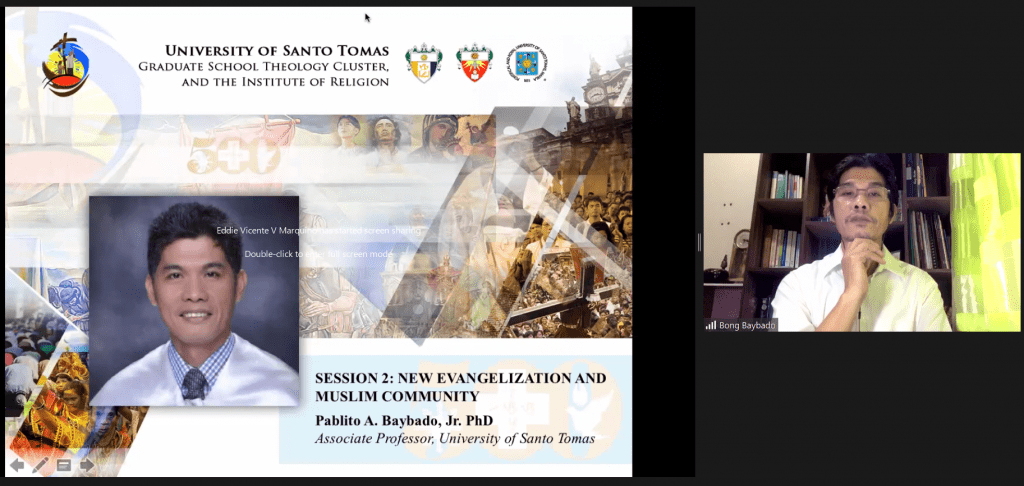In celebration of the 500 years of Christianity in the Philippines, the University of Santo Tomas Graduate School Theology cluster and the UST Institute of Religion virtually gathered over 200 people to reflect on the origins and the future of evangelization in the Philippines. “The 500th Anniversary of Christianity and the New Evangelization” webinar was held on March 20, 2021, through Zoom.

The session featured notable academics, UST Graduate School faculty members, researchers, and writers. Among these include anthropologist Rev. Fr. Hermel O. Pama, O.P., Ph.D., who discussed “New Evangelization and Indigenous Peoples”; Religions for Peace Asia Associate Secretary-General Pablito A. Baybado, Jr., Ph.D., who spoke about “New Evangelization and the Muslim Community”; and Philosophy professor and writer Rev. Fr. Delfo Canceran, O.P., Ph.D., who presented “New Evangelization and the Cognitive Science of Religion.”
Rather than look back at the colonial history of Christianization, which started when the first Mass was held on March 21, 1521, in the islands that would later be known as the Philippines, the webinar recognized the need for evaluation and renewal as one Church. Following the CBCP exhortation on the New Evangelization, evangelizing is no longer linked with colonization but with dialogue and friendship.
As Fr. Pama explained, “A critique of imperialism is needed in the recovery of the indigenous. We have to speak of the historical event of colonization 500 years ago and not only gloss over it and replace it with Christianization. In the same breath, we have to speak of the archaeology of decolonization that occurred astride colonization.”
In particular, Fr. Pama highlighted the concept of ‘communitas’, a sense of community that brings out transformation within a group. In his anthropological fieldwork, he observed this value present in indigenous groups. New Evangelization is owning the faith and communicating its mystery by recovering the sense of belongingness that is rooted locally. By re-empowering ‘communitas’, the lingering colonial message of old evangelization is eschewed, and evangelization today is renewed, into enculturation as Pope Paul VI defines it: “Incubation of the Christian mystery in the genius of your people.”
Baybado, the coordinator of Uniharmony Partners Manila and Interfaith Community in the Philippines, focused on Muslim-Christian relations for the second talk.
“Colonization is simultaneously Christianization for Christians and De-Islamization for Muslims. This branding of colonialism has a long-standing impact on the Muslim and Christian relations until today,” said Baybado, explaining that the Filipino Muslim community is wary of being submerged in a Christian-based national identity that detaches them from their ethno-cultural roots.
Baybado shared that, “For us to achieve a united national identity, we have to depart from the assimilation and integration policies. When we talk about the new evangelization, we must reflect first on the different institutions where we project our Christian identity and if we have mechanisms here for our Muslim brothers and sisters to grow and allow their Islamic way of life so that we Christians begin to see, acknowledge, and love them according to who they are.”
Fr. Canseran’s talk on the Cognitive Science of Religion (CSR) capped off the webinar.
“The Church is encouraging interdisciplinary approach in theology to be able to develop a deeper dialogue with different scientific fields,” said Fr. Canseran explaining that insights from cognitive science, or the discipline that studies how humans think and perceive, can be applied to questions in the study of religion.
CSR claims that human conceptual structures enable and constrain cultural expression, which includes religious thought and action. In particular, how people can believe in the idea of God could be attributed to the Hypersensitive Agency Detection Device, a cognitive mechanism of the mind that detects movement or action and assumes it is acting with agency and purpose, said Fr. Canseran. The feeling of miracle stories experienced through the HADD may strengthen beliefs or motivate people to transmit and share the concept of an unseen God who effects visible and tangible change.
Taking an interdisciplinary approach to New Evangelization, the conference had resource speakers and reactors from different disciplines in the social sciences, especially history, anthropology, education, religion, sociology, and politics, among others.
The members of the panel of reactors were Br. Mervin Lomague, O.P., of the Dominican Province of the Philippines, Carolina Dionco, Ph.D., of the Mary Hill School of Theology, Dr. Mariel A. Abante of the Sta. Teresa College – Bauan, Batangas Confraternity of Christian Doctrine, Asst. Prof. Val Brillo of the UST Institute of Religion, Arche Ligo of the Institute of Formation and Religious Studies, and Religious Educators Association of the Philippines President Asst. Prof. Reuel Rito Seño of the De La Salle College of St. Benilde.




